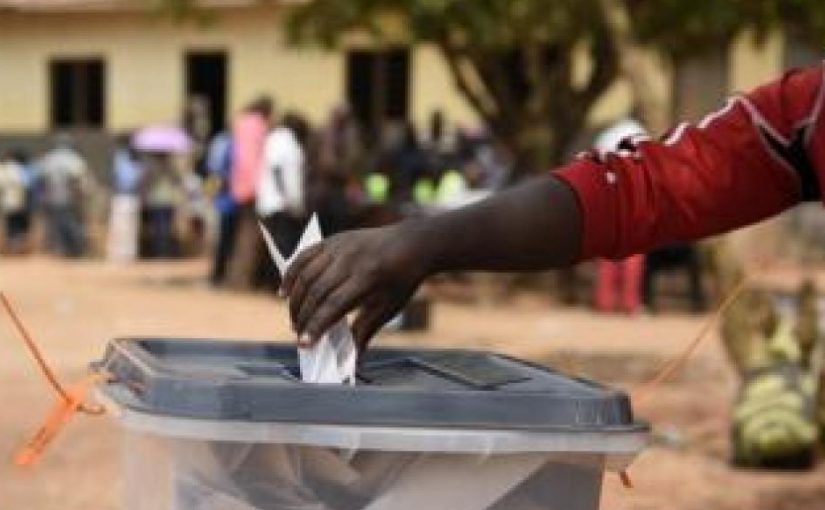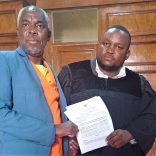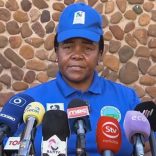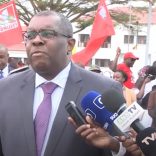Mozambique | Just In: Vitano Singano released from prison
Local courts reject opposition appeals on technicalities, refusing to consider the issues – CIP, Mozambique Elections

File photo / For illustration purposes only
At least 7 Renamo and MDM appeals against election results have been rejected by local courts on technicalities, without accessing the merits of the cases. Indeed, the Marromeu district court agreed there were “irregularities” but refused to consider them. This is the first time that opposition parties have used a new electoral court system, introduced in the 2014 election law. (See article below for more details.)
The two main reasons for rejection were that opposition parties did not appeal within 48 hours after the local results were posted, and that they did not protest to the district elections commission at the time the decision was being taken. The electoral law says that various operations including counting are open to party delegates who have the right to protest immediately against a decision, and that this must be done first. But Renamo alleges in its protests that counts were done in secret, not only without party representatives, but also with Renamo nominated members of STAE and the local elections commission. Thus it could not protest at the time.
Renamo and MDM say they have appealed to the Constitutional Council (CC), which acts as the upper electoral court, and must rule on these cases well.
Both Renamo and MDM appealed against the Matola result. Renamo has also appealed about Tete, Moatize, Alto-Molocue, Monapo and Marromeu.
There have been 31 appeals against the election results, the spokesperson for the Supreme Court, Jose Beirao, announced at a Maputo press conference on Friday. Of these 13 have been thrown out because they were not first presented at polling stations or to the district election commission.
Two overlapping appeal routes
The revised electoral law creates two overlapping appeal routes, the traditional route via the National Elections Commission (CNE) and a new route, being tested for the first time, via the courts. Both end with the Constitutional Council (CC).
The CNE must announce the final results of the 10 October municipal elections within two weeks, by Thursday 25 October. Within the CNE, opposition party appointees will present their evidence contesting the results of the 7 municipalities. The CNE has, in the past, sometimes taken their own provisional count, which is based on polling station results sheets, in preference to the result announced by the city or district election commission. After the CNE announces the “final” results, they must be confirmed by the CC, and the parties can appeal to the CC against the CNE decision. Until now, this has been the procedure.
But the revised law creates a second channel via a new electoral court system, with very tight deadlines:
+ the first protest is to the district or city election commission, which must be made when the decision is being taken.
+ within 48 hours of the result being posted, this can be appealed to the city or district court.
+ the court must rule with 48 hours.
+ this can be appealed to the CC within 3 days.
+ the CC must rule within 5 days.
But these two calendars do not match, so the CNE may have to make its decisions without knowing how the CC will rule on the same issues.
The courts and CC can order that the election be run again for individual polling stations or the entire municipality, or can order a recount.
There are two “catch 22” problems in the court appeal process. First, the opposition says it was excluded from the final district counts in several municipalities, and did not know they took place, and is in part protesting its exclusion. The local courts say since they were not there to protest at the time, they have no appeal. Second, in at least one case the opposition says the intermediate results were never formally posted, and again the local court appears to say this prevents any protest against the illegality.
The Constitutional Council can simply accept the narrow technical rejections by the local courts, but if it wishes, it has a huge freedom to investigate and can also rule on the facts of the case.
Two final tables now available on http://bit.ly/LocEl2018.
Complete intermediate election results – Intermediate results as published by city and district elections commissions
Comparison tables – Comparison of intermediate results as published by city and district elections commissions with provisional counts done by STAE and parallel counts done by media and civil society.
Details of the 7 main appeals
Matola: Renamo and MDM both appealed to the Matola District Court against the results announced by the Matola city elections commission (Comissao de Eleicoes da Cidade, CEC). The court rejected both appeals without considering their merits. The Renamo appeal was rejected on the grounds that it had not first protested to the CEC and had not submitted its appeal to the court within 48 hours after the result was posted.
The intermediate count was done by the CEC on 12 October and formally posted on 13 October. Renamo and MDM say they count was done in their absence, and that only Frelimo-linked members of the CEC signed the formal results sheets. The results announced gave Frelimo victory of just 1%, with 137,875 against 135,678 for Renamo.
Marromeu: Renamo appealed to the district court to invalidate the results on the grounds that some polling stations had votes counted in secret. The court wrote in its ruling that it “recognised that the had been irregularities” but refused to consider these because Renamo had not protested to the elections commission at the time.
The head of operations of the local technical secretariat (STAE) and police took all the voting materials from 10 polling stations and STAE then counted in secret, without party observers or opposition members of STAE and the district elections commission. At the 29 polling stations where the count was completed in public, Renamo was ahead by 7406 votes against 4457 for Frelimo. But the final results sheets for the full 39 polling stations (including the 10 counted in secret) gave Frelimo the victory with 8330 (47%) against 7810 for Renamo (44%) and 1533 for MDM (9%).
Moatize: Renamo appealed to the district tribunal for a recount but this was rejected because it did not appeal within 48 hours and did not appeal to the local elections commission. Renamo says it could not have done so, as a recount was done without it being present.
The count done on 11 October gave Renamo victory with 11,169 to 9,856 for Frelimo. The warehouse for electoral materials has for locks with Frelimo, Renamo, MDM and STAE each holding a key to one lock. Frelimo demanded a recount; Renamo and MDM were opposed and refused to allow the warehouse to be opened for a recount. Late on the night of 12 October, Frelimo and STAE broke into the warehouse and carried out a recount without opposition parties present, which declared more than 1000 votes for Renamo invalid. The official result gave Frelimo victory by 97 votes, 9839 for Frelimo and 9742 for Renamo.
Alto Molocue: Renamo says it appealed to both the District Elections Commission (CDE) and the local court. Party agent Fernando Mario says the CDE did not respond and the local court rejected the appeal on the grounds that Renamo had not gone first to the CDE. The court noted that Renamo had not appended copies of the results sheets and minutes that it was protesting against.
Provisional results based on all polling stations posted by CNE/STAE in Maputo and a 100% parallel count by EISA both gave Renamo victory with more than 50% of the votes. But the official results issued by the CDE give Frelimo a narrow victory by 113 votes, with Frelimo 45.4% and Renamo 44.8%. (See our comparisons table on http://bit.ly/LocEl2018)
Monapo: The local court rejected the Renamo appeal because it did not first appeal to the CDE. The CDE did not formally post or announce the results.
The CNE/STAE provisional count, based on 62 of 63 polling stations, gave Renamo victory: Renamo 9186 (49.16%), Frelimo 8480 (45.38 %), MDM 609 (3.26%) and AMUSI 410 (2.19%). But the results finally released by the CDE, based on all 63 polling stations, gave Frelimo 9579 against 9363 for Renamo. That means the extra polling station gave Frelimo 1099 votes, which is impossible because the maximum number of people registered in a polling station is 800.
Gurue: MDM appealed to the district count for a recount, but the appeal was rejected “as lacking basis”, according to the party agent, Nelson Albino.
Tete city: Renamo appealed to the city court asking for a recount, but the appeal was rejected on the grounds that correcting the alleged illegalities would not “influence significantly the election result”, as is required by law (artigo 144 da Lei 7/2018).
Renamo pointed out that the published official results had about 4000 more valid votes than the sum of the valid votes from the polling station results sheets, and the court accepted this. Renamo wanted a ruling that the official results were false, using made up numbers rather than those from the polling stations. But the court said this made no difference to the Frelimo victory.
During voting: Renamo has also made at least two protests to district or city courts over alleged misconduct on polling days. In Nhamatand, Sofala, Renamo said that at one polling station the number of votes cast was greater than the number of people registered, but it failed to show the polling station result sheet it was protesting against. In Milange it protested against incidents during voting; the case was rejected by the tribunal because Renamo did not object at the time, but Renamo is appealing to the Constitutional Council about Milange, AIM reports.
Comment: Will the Constitutional Council judge the facts?
MDM and Renamo are appealing to the Constitutional Council (CC) against rejections by the lower courts on technical grounds, and are asking the CC to rule on the substance of the objections.
Law No. 7/2018, of August 3 (article 140), stipulates that parties may file appeals against irregularities found in the district (or city) tabulation of results but imposes the condition that the irregularities “have been the subject of complaint or protest “.
The same law establishes (article 109, numbers 3 and 4) that “party agents may attend the tabulation process” and during the counting operations may present complaints, protests, and counter-protests on which the election commission must decide.
But in some municipalities the party agents were never told the date and location of the counts. STAE and the CDE did the tabulations in secret, without allowing the parties to be present. Not being there, they could not protest – which is a condition of filing a complaint with the local court.
The Constitution establishes that “citizens have the right to appeal to the courts against acts that violate their rights and interests recognised by the Constitution and by law” (article 70). Here, the term citizen should be interpreted broadly to include legal persons – in this case, political parties, coalitions, and citizens lists.
The Electoral Law, by imposing conditions for access to the courts, puts a barrier to access to justice, a constitutionally enshrined right.
The law correctly demands that parties make their protests at the lowest possible level in order to correct errors as they are made, and not wait until the end to go to court. But this is not possible when the electoral bodies themselves promote secrecy in their actions or simply refuse, without grounds, to receive the objections of the opposition. Opposition parties are then unable to complain promptly, which means that the requirement is no longer appropriate and justice is not being served.
The Constitutional Council itself set a precedent in 2013 of not restricting itself to procedural formalities and the documents submitted when it investigated in detail the Gurue municipal election fraud, and eventually ordered a new election. It could follow its own model again. The CC has at its disposal a wide range of sources, including the media, election observation reports, and the decisions of the district electoral courts, even when they have initially denied the requests. Thus, faced with so many irregularities verified and reported in the elections of 10 October, it is hoped that that, the CC does not take a narrow view, but as with Gurue five years ago, plays an active role judging the conflicts to ensure the fairness of the process. bn
Comment: Licence to shoot and steal?
In his short statement Thursday Nyusi heaped high praise on the Mozambican people, electoral authorities and police for their roles in the 10 October municipal election. And, for the most part, it was deserved praise, of the record turnout and the smooth running of voting in most municipalities.
But in Moatize, Tete, Marromeu, Alto Molocue, Monapo, Gurue and elsewhere the police and district election commissions were partisan. Police protected Frelimo supporters responsible for violence, even including a policeman who is a Frelimo official who shot a Renamo supporter in front of a Tete police station. District election commissions carried out dubious second counts and changed results.
The president said “We gave an eloquent example of democratic coexistence even though there were some acts of violence that we strongly condemn”. Just 8 words of criticism in a laudatory speech. How will police and electoral officials in Tete and Marromeu interpret that speech?
Surely some will interpret it as praise for their conduct in promoting a Frelimo victory by all means, fair and foul. They may see it as a licence to shoot the opposition and to steal the election. Frelimo is always careful in what it says – it never promotes misconduct or violence. It is not in what President Nyusi said, but in what he did not say. It is a “nod and wink” that says everything was OK. And it could lead to more violence and electoral misconduct next October. jh
Month in jail for ballot box stuffing
A man was caught attempting to place ten extra votes in the ballot box in Marromeu. He was tried at a district court, found guilty, and sentenced to a month’s imprisonment plus a fine of twice the monthly minimum wage (8,510 meticais, $142).
This was the most serious of 73 electoral crimes dealt with by district and city counters between 25 September and 18 October. Of these 52 have come to trial, Supreme Court spokesperson Jose Beirao tolda Maputo press conference on Friday.
Most of the offences concerned the destruction of opponents’ political propaganda, AIM reports. Some defendants were found guilty and fined, and some were acquitted. The heaviest fine (13 times the minimum wage – 55,315 MT) was imposed on a voter caught campaigning on voting day. Judgement in the case of several election offences in Alto Molocue is pending, awaiting evidence from witnesses.













Leave a Reply
Be the First to Comment!
You must be logged in to post a comment.
You must be logged in to post a comment.